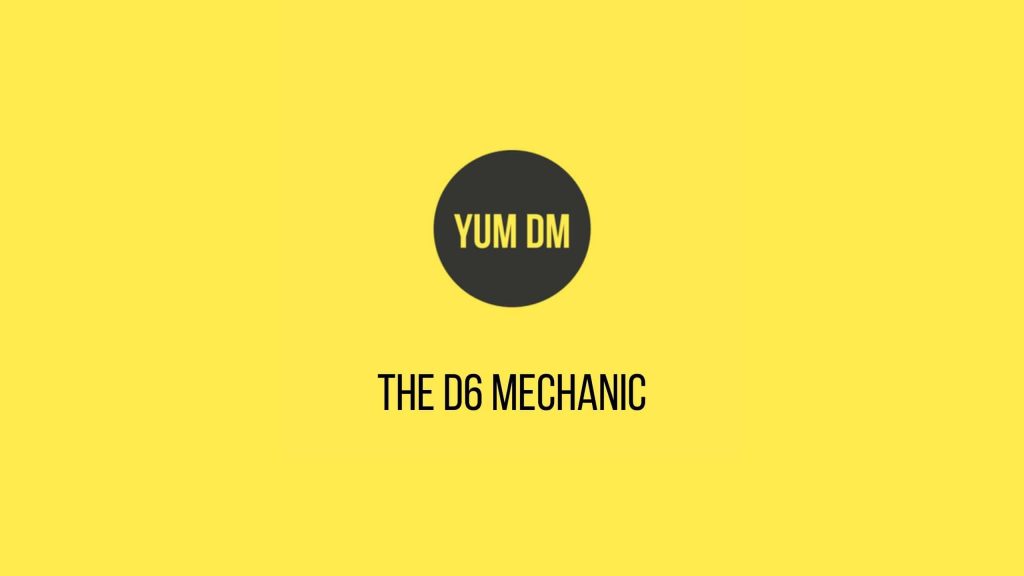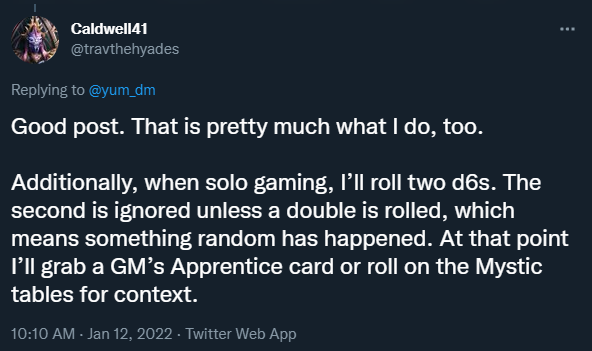
What’s going to happen?
Let the simple D6 Mechanic decide for you.
This simple mechanic will allow you to add in some randomness to your Dungeons and Dragons sessions.
Instead of making decisions all the time, let the die decide for you.
All you have to do is decide on the odds.
A simple mechanic like the D6 Mechanic can be used at the table within seconds.
Let’s look at an example.
D6 Mechanic Example
Say the PCs barge into the king’s chamber with some important news the captain of the guard has been keeping from the king.
Now, this is a king, will he even bother to see the PCs? He is a very important man and these are just commoners after all.
There are no rules for this.
Yes, you could use a reaction roll, but the PCs haven’t even spoken to the king yet, apart from shouting out his name like a rabble and trying to get past his royal guardsmen.
Instead of deciding arbitrarily, you use the D6 Mechanic.
Giving the king’s status and the status of the PCs, you give the odds of just 2 in 6 chance of the PCs convincing the king to listen to them.
So, on a roll of 1 or 2 on a D6, the king will agree to hear them out. (And that’s when you can roll reaction based on what the PCs say and do next).
You roll the dice and get a 3, the king pauses for a moment and then wanders off, telling his royal guard to throw out the rabble.
Oh, my. The captain of the guard smiles behind his bushy beard.
Additional Results
You can also add extra results.
In the example above, you could have said that on a roll of 6, the king would have the PCs thrown in jail instead of merely expelling them.
And you can use this in all sorts of situation that rules don’t cover.
Anytime you think to yourself questions like “what would they do?” or “what state is that item in?” you can use the D6 Mechanic.
Personality
You can also base the odds on the situation and people.
In the example above, using the MAP method (you can find this method in Issue 0 of my zine, d12 Monthly), where you list an NPCs main traits – Motivation, Appearance, Personality – if the king’s persnality was impatient or shy, then you could have given just a 1 in 6 chance of success.
If his personality was gracious or welcoming, you could have bumped it up to a 3 in 6 chance.
SoloRPG
The D6 Mecanic can also be a boon for soloRPG play as you are leaving decisions normally made for the GM, up to the die.
Other Examples
The characters come across a chasm in the dungeon, and they spot an old rusted chain dangling from the ceiling halfway they could use to swing across.
In what condition is the chain in?
Let the die decide.
You quickly decide that on a roll of a 1 or 2, it is so old it snaps if a character tries to use it.
Roll the die.
You could also easy and quickly alter this for small (and presumably light) characters – ruling it only breaks on a 1 in 6 for them.
A third example could be if the rogue or thief in the party wants to sneak past the guard post.
Is the guard attentive?
Roll the die.
You decide it’s 50-50 – on a 1-3, they will be unattentive, and on a 4-6, they will be very attentive.
You could say also on a 1 they are looking in the direction the rogue is (maybe they have had intruders before), so giving a -2 penalty to the rogue’s check; and on a 6, they are alseep on the job, giving an auto success (or a good bonus) to the rogue’s check.
The D6 Mechanic can be used many different times throughout each D&D session and campaign.
Notes on the D6 Mechanic
A couple of notes to keep in mind.
- This system relies on there being a chance – however small – that something is the way it is. If something is truly impossible, don’t bother rolling.
- You can use other dice if you feel the odds are greater. For example, you could use a D8 and have the odds 1 in 8.
- This will expand and test your spontaneity, but that’s a good thing. Part of being a good GM is being able to wing it.
Update
Caldwell41 over on Twitter mentioned that he uses a neat little system based on this one.

So, he uses 2D6, but the second D6 only comes into effect if doubles are rolled. If this happens, he then consults a table to find out what odd thing happens.
I really like this system as it throws in an element of complete randomness to a situation and allows you to stretch your creativity.
You can see the original tweet as well.
Over To You
Is this something you would want to use in your D&D campaign?
While You’re Here…
Since 2021 I have been publishing a monthly zine, which has a ton of articles for any edition of Dungeons & Dragons.
They are also available on DriveThruRPG and printed copies are available via my Patreon.
I also have a growing Discord, where you can join in on my regular West Marches campaign.
I will also be releasing some more products in the near future, like several monster manuals and a series of soloRPG publications.
Feel free to reach out to me on Twitter any time.
While You’re Here…
Since 2021 I have been publishing d12 Monthly, a monthly zine, which has a ton of articles for any edition of Dungeons and Dragons.
Printed copies are available in my store. The PDF is available on DriveThruRPG and you can get both, plus support my work, via my Patreon.
I will also be releasing some more products in the near future.
Feel free to reach out to me on Twitter or my contact page any time.

I don’t use a table. I have the player roll a D20. The higher the more positive result and the lower the more negative result. This may be modified based on the situation.
That’s cool. I would find it a bit swingy – I like the compactness and ease of the D6. And you don’t need a table – just the odds of success/failure.
Nothing swingy about it. It’s the same as a D6 except that there’s more granularity. With a D6, there’s only 6 possible outcomes really limiting the outcomes. Plus, not sure where you got that I use a table as I don’t. That’s the point.
Hey
A D6 is easier to use as there are less outcomes and the brain can compute it quicker. There is no need for granularity when you have just 2-3 options.
As for the table thing – you mentioned it in your comment and made it sound like there were tables involved.
Bring on the randomness
Ha! Glad you agree. 🙂